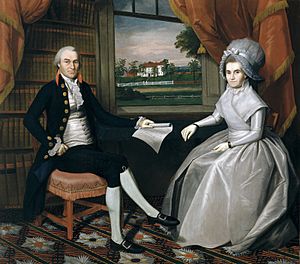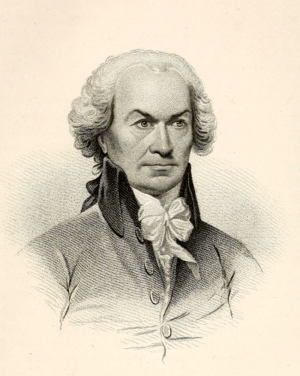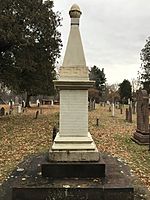Oliver Ellsworth facts for kids
Quick facts for kids
Oliver Ellsworth
|
|
|---|---|
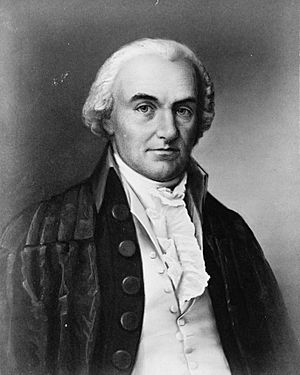 |
|
| 3rd Chief Justice of the United States | |
| In office March 8, 1796 – December 15, 1800 |
|
| Nominated by | George Washington |
| Preceded by | John Rutledge |
| Succeeded by | John Marshall |
| United States Senator from Connecticut |
|
| In office March 4, 1789 – March 8, 1796 |
|
| Preceded by | Seat established |
| Succeeded by | James Hillhouse |
| Personal details | |
| Born | April 29, 1745 Windsor, Connecticut, British America |
| Died | November 26, 1807 (aged 62) Windsor, Connecticut, U.S. |
| Political party | Federalist |
| Spouse | Abigail Wolcott |
| Children | 9 |
| Relatives | Delia Lyman Porter (great-granddaughter) |
| Education | Yale College College of New Jersey (AB) |
| Signature |  |
Oliver Ellsworth (born April 29, 1745 – died November 26, 1807) was an important person in early American history. He was one of the Founding Fathers who helped create the United States. He worked as a lawyer, judge, politician, and diplomat.
Ellsworth helped write the U.S. Constitution. He also served as a Senator for Connecticut. Later, he became the third Chief Justice of the United States. This is the highest judge in the country. He even received some votes in the 1796 presidential election.
Born in Windsor, Connecticut, Ellsworth went to the College of New Jersey. There, he helped start a debating club. In 1777, he became a state attorney. He was also chosen to be a delegate to the Continental Congress during the American Revolutionary War. He served as a state judge in the 1780s. In 1787, he was a delegate at the Philadelphia Convention. This meeting created the U.S. Constitution.
At the convention, Ellsworth helped create the Connecticut Compromise. This plan balanced power between large and small states. He also worked on the committee that wrote the first draft of the Constitution. However, he left before the final document was signed.
Ellsworth's influence helped Connecticut approve the Constitution. He was elected as one of Connecticut's first two Senators. He served from 1789 to 1796. He was the main writer of the Judiciary Act of 1789. This law shaped the federal court system. It also gave the Supreme Court power to review state court decisions. Ellsworth was a strong supporter of Alexander Hamilton in the Senate. He helped pass important financial laws. He also supported the United States Bill of Rights and the Jay Treaty.
In 1796, President George Washington nominated Ellsworth to be Chief Justice. The Senate approved him quickly. He served until 1800, when he resigned due to poor health. Not many big cases came before the Supreme Court during his time. He is mostly remembered for changing how judges wrote their opinions. He encouraged judges to write one main opinion for the Court. At the same time, he served as an envoy to France from 1799 to 1800. He signed an agreement to end fighting with France. John Marshall became the next Chief Justice. Ellsworth then served on the Connecticut Governor's Council until he died in 1807.
Contents
Early Life and Family
Ellsworth was born in Windsor, Connecticut. His parents were Captain David and Jemima Ellsworth. He first went to Yale College in 1762. But he soon moved to the College of New Jersey, which is now Princeton. There, he helped start a debating club. He earned his degree in 1766.
After college, Ellsworth studied law for four years. He became a lawyer in 1771. He then became a very successful lawyer and politician.
In 1772, Ellsworth married Abigail Wolcott. They had nine children together. Two of their sons became very famous. William Wolcott Ellsworth became the governor of Connecticut. He also served in Congress. Henry Leavitt Ellsworth became the first head of the U.S. Patent Office. He was also the mayor of Hartford and a leader at Aetna Life Insurance.
Fighting for Independence
Ellsworth's law practice grew steadily. In 1777, he became the state attorney for Hartford County. That same year, he was chosen to represent Connecticut in the Continental Congress. He served there from 1777 to 1780 and again from 1781 to 1783. He worked on many important committees.
Ellsworth also helped Connecticut's efforts during the Revolution. He was part of a committee that managed the state's war spending. In 1777, he joined the Committee of Appeals. This group was like an early version of the Supreme Court. He also served on the Council of Safety. This group, with the governor, managed all military actions for Connecticut. His first time as a judge was in 1785. He then spent four years on the Connecticut Superior Court.
Helping Create the Constitution
The Constitutional Convention
Ellsworth was a delegate from Connecticut at the 1787 Constitutional Convention in Philadelphia. He attended with Roger Sherman and William Samuel Johnson. Many delegates were lawyers, and some, like Ellsworth, had been judges.
Ellsworth played an active role from the start. On June 20, he suggested using "the United States" to name the new government. This name had been used before in the Declaration of Independence. Ellsworth wanted to keep it to show that the new government was a union of states. His idea helped make "the United States" the official name for the government.
The Great Compromise
Ellsworth was very important in creating the Connecticut Compromise. The Convention was stuck on how states would be represented in Congress. Larger states wanted representation based on population. Smaller states wanted each state to have the same number of votes. Ellsworth and Roger Sherman suggested a two-part Congress. The Senate would have two members from each state. The House of Representatives would have members based on each state's population. This compromise was accepted on July 16, 1787.
Ellsworth also voted for the Three-Fifths Compromise. This decided how enslaved people would be counted for representation. Later, Ellsworth spoke against slavery at the convention. He also helped keep the idea of judicial review out of the first draft of the Constitution.
Ellsworth was part of the Committee of Detail. This committee wrote the first draft of the Constitution. They based it on ideas already agreed upon by the Convention.
Ellsworth left the Convention before the final document was signed. But he wrote articles called Letters of a Landholder to encourage people to approve the Constitution. He also played a big part in Connecticut's meeting to approve the Constitution in 1788. He argued that judicial review would protect the federal government's power.
Serving in the Senate
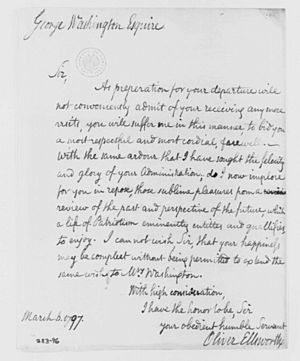
Oliver Ellsworth and William Samuel Johnson became Connecticut's first two U.S. Senators. Ellsworth was part of the Federalist Party. He became a very powerful leader in the Senate. John Adams said he was a strong supporter of President Washington's government.
Ellsworth's first big project was the Judiciary Act of 1789. This law created the structure of the federal court system. It also gave the Supreme Court the power to overturn state court decisions that went against the U.S. Constitution. This was a very important step in making the federal government strong.
After the Judiciary Act, Ellsworth supported the United States Bill of Rights. This set of amendments protects the rights of states and citizens. The Judiciary Act gave the federal government power. The Bill of Rights protected people from that power. They worked together to balance the government.
Ellsworth was a main supporter of Alexander Hamilton's economic plans. He helped pass laws about the national debt and creating the First Bank of the United States. He also helped bring North Carolina into the Union. He played a key role in convincing President Washington to send John Jay to England. This led to the Jay Treaty in 1794. The treaty helped prevent war with England.
Chief Justice and Later Life
Leading the Supreme Court
On March 3, 1796, President George Washington nominated Ellsworth to be Chief Justice of the United States. The Senate quickly approved him. He took his oath on March 8, 1796.
Not many big cases came before the Supreme Court during Ellsworth's time as Chief Justice. However, some important rulings were made:
- Hylton v. United States (1796) supported a federal tax.
- Hollingsworth v. Virginia (1798) said the president has no official role in changing the Constitution.
- Calder v. Bull (1798) said that a specific part of the Constitution only applied to criminal cases.
- New York v. Connecticut (1799) was the first time the Court heard a dispute between two states.
Ellsworth's main legacy as Chief Justice was changing how judges wrote opinions. Before him, each judge wrote their own separate opinion. Ellsworth encouraged the Court to write one main opinion that showed what most judges agreed on. This practice continues today.
In the 1796 presidential election, Ellsworth received 11 electoral votes.
In 1799, President Adams sent Ellsworth to France. His job was to settle disagreements with Napoleon's government. These disagreements could have led to war. Ellsworth signed an agreement, but some Americans thought it was too generous. Ellsworth also became very sick during his travels. This led him to resign from the Supreme Court in late 1800 while still in Europe.
Later Years
Ellsworth returned to America in 1801. He retired from national public life. However, he did serve again on the Connecticut Governor's Council. He was also recognized for his achievements in 1803.
Oliver Ellsworth died at his home in Windsor on November 26, 1807. He was 62 years old. He is buried at the Palisado Cemetery in Windsor.
Legacy and Impact
Ellsworth's role in helping to create the United States was very important. But sometimes his contributions are overlooked. He was not known for long speeches. He often worked behind the scenes to get things done.
Ellsworth helped make the federal government strong. This made him popular in the early years of America. However, as the country grew, his specific contributions became less known. Today, many people do not know much about him.
Ellsworth's twin sons followed in his footsteps. William Wolcott Ellsworth became the Governor of Connecticut. He also served in Congress and as a judge. His twin brother, Henry Leavitt Ellsworth, became the first head of the U.S. Patent Office. He also became president of Aetna Life Insurance Company. Henry Leavitt Ellsworth helped create the U.S. Agriculture Department. He was also a friend and supporter of inventors like Samuel Colt and Samuel F.B. Morse. Morse's daughter, Annie Ellsworth, suggested the first message sent by telegraph: "What hath God wrought?" Henry Leavitt Ellsworth also gave a lot of money to Yale College.
Ellsworth was seen as a valuable addition to the Supreme Court. But he resigned after only four years. This was because of his constant pain, made worse by his travels to Europe.
In 1800, the town of Ellsworth, Maine, was named in his honor.
See also
- Demographics of the Supreme Court of the United States
- List of justices of the Supreme Court of the United States
- List of United States chief justices by time in office
- List of United States Supreme Court justices by time in office
- United States Supreme Court cases during the Ellsworth Court
 | May Edward Chinn |
 | Rebecca Cole |
 | Alexa Canady |
 | Dorothy Lavinia Brown |


